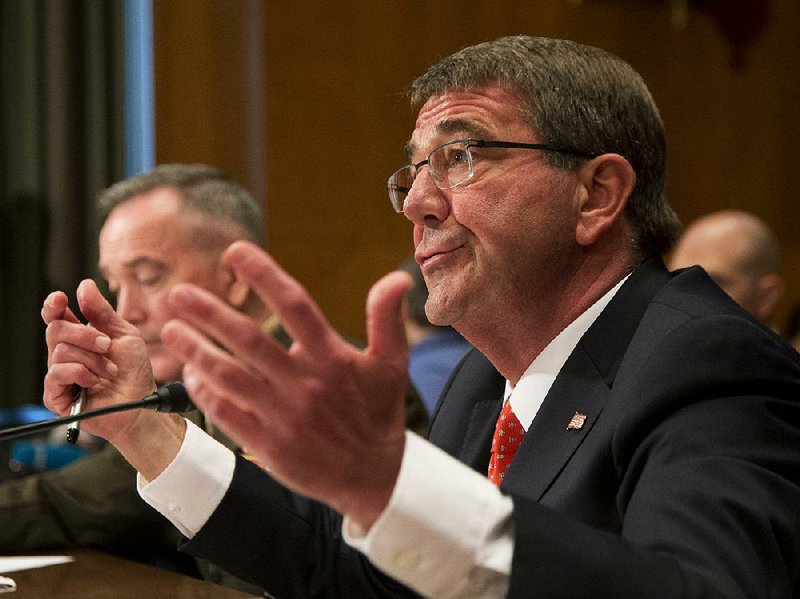WASHINGTON -- Defense Secretary Ashton Carter attacked as "another road to nowhere" a Republican plan that cuts $18 billion from the wartime operations account to pay for weapons and troops the Pentagon didn't request, kicking the battle over how much to spend on the U.S. military into high gear.
Testifying Wednesday before the Senate Appropriations defense subcommittee, Carter called the proposal advanced by Rep. Mac Thornberry of Texas, the Republican chairman of the House Armed Services Committee, "deeply troubling, and flawed." Under Thornberry's proposal, the billions of dollars shifted out of the wartime fund would be restored in a supplemental budget.
"It's gambling with war-fighting money at a time of war -- proposing to cut off our troops' funding in places like Afghanistan, Iraq, and Syria in the middle of the year," Carter told the panel.
As Carter testified, Thornberry opened his committee's debate over the defense policy bill that authorizes military spending for the fiscal year that begins Oct. 1. He defended his plan, which is a central part of the bill, as a bulwark against deploying American troops without adequate training and equipment.
Thornberry and other Republicans have sharply criticized President Barack Obama's administration for presenting Congress with a $583 billion defense budget for 2017 that they argue has gaping shortfalls, forcing U.S. military commanders to cut training hours, defer the maintenance of equipment and forestall the purchase of new equipment.
"The bottom line for me this year is that it is fundamentally wrong to send service members out on missions for which they are not fully prepared or fully supported," Thornberry said Wednesday.
By moving the $18 billion from what's called "overseas contingency operations," Thornberry's proposal provides the money to purchase 11 additional F-35 stealth fighter jets, which cost roughly $100 million each, more Black Hawk and Apache helicopters, and additional troop-carrying V-22 tilt-rotor aircraft. Money also is added for Air Force depot maintenance, Javelin missiles and Hydra rockets.
The bill also prohibits the Army from falling below 480,000 active-duty soldiers, adds 7,000 service members to the Air Force and Marine Corps, and approves a 2.1 percent pay raise for the troops. The Navy would be barred from cutting one of its 10 carrier air wings, as the Pentagon had proposed.
But there's a hitch in Thornberry's plan: He needs help from Obama's successor. To make up for the war spending shortfall, the new president will have to submit a supplemental budget to Congress in early 2017 before the wartime account runs out.
"Starting to turn around our readiness shortfalls while staying within the total dollars requested by the administration means that there is not enough money to fund the [wartime] activities proposed by the president for the full year," Thornberry said. "There will be enough for roughly six months."
But Carter told the Senate panel that Thornberry's plan actually degrades combat readiness by retaining troops and buying equipment that can't be sustained.
"It's another road to nowhere, with uncertain chances of ever becoming law, and a high probability of leading to more gridlock ... exactly the kind of terrible distraction we've seen for years, that undercuts stable planning and efficient use of taxpayer dollars, dispirits troops and their families, baffles friends, and emboldens foes," Carter said. "I cannot support such maneuvers as secretary of defense."
Marine Corps Gen. Joseph Dunford, the chairman of the Joint Chiefs of Staff, testified with Carter and told the panel that adding more forces and equipment could compound the combat-readiness problem.
"To me, the No. 1 priority that we have today is to make sure whatever size force we have is capable," Dunford said. "Trying to achieve that balance is really what this year has been all about."
A Section on 04/28/2016
